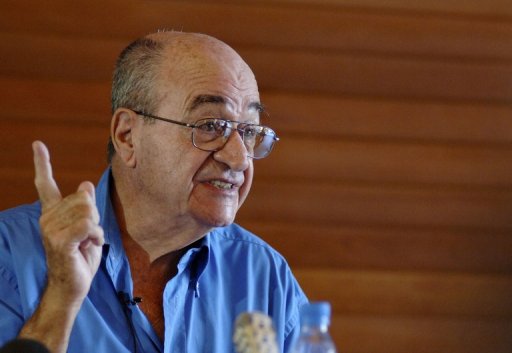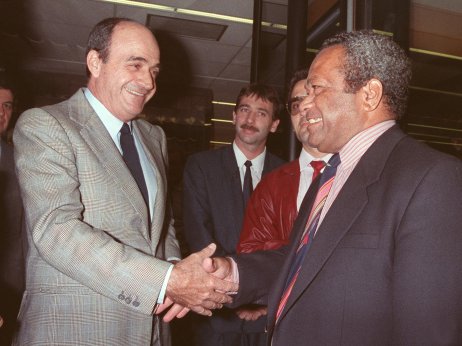
SUVA: Fiji’s Prime Minister Commodore, Voreqe Bainimarama, has extended a message of condolence to neighbouring New Caledonia, expressing “deep regret” at the death of the French Pacific territory’s former strongman, Jacques Lafleur, who was buried on Friday.
Lafleur died, aged 78, from a cardiac arrest on Saturday, December 4,2010, at his Gold Coast residence in Queensland, Australia.
“It is with deep regret that I have learnt the untimely demise of the esteemed political and New Caledonia territory leader the late Jacques Lafleur … the passing away of the late Mr Lafleur was a loss not only to New Caledonia but the region as well”, the condolence letter relayed by Fiji’s Ministry of Information states.
“Mr Lafleur dedicated much of his life pursuing with passion what he felt was ideal for the people of New Caledonia and resulted being a signatory to both the 1988 Matignon Accord and the 1998 Nouméa Accord. His death is therefore a loss to New Caledonia and the region. Please accept on behalf of the peoples of Republic of Fiji, as well on my own behalf, our most sincere condolences on the passing of the late Mr Jacques Lafleur,” Commodore Bainimarama said.
On Friday, 10 December 2010, in New Caledonia’s capital Nouméa, Lafleur’s funeral gathered high officials from metropolitan France, including French minister for Overseas countries and territories, Marie-Luce Penchard, who read a personal message from French President Nicolas Sarkozy.
In his message, Sarkozy hailed a “respected parliamentarian, an experienced politician and a passionate defender for New Caledonia’s place within France”.
Sarkozy also sent an initial message soon after the announcement of Lafleur’s death.
He then paid tribute to a man who has “embodied a commitment to maintaining New Caledonia a part of France”.
Civil peace
“The Head of State particularly wishes to pay respect to the memory of the man who has been, with Jean-Marie Tjibaou, the brain father of the Matignon-Oudinot Accords and later the Nouméa Accords, which have put an end to the tragic events of the mid-1980s and restored civil peace in New Caledonia”, a release from the French Presidency said on Sunday.
“A clever and passionate politician, Jacques Lafleur has always been able, when the essentials were at stake, to extend a hand to his adversaries in order to avoid the return of violence and division in New Caledonia. On that respect, he has undeniably left his mark on our country’s history”, the release went on.
Foreign dignitaries, including representatives from Australia and New Zealand, also attended the funeral, as well as former Vanuatu Prime Minister Maxime Carlot, who had also been close to Lafleur.
Gaston Tong Sang, President of French Polynesia, had also travelled to Nouméa for the occasion.
An estimated 1500 people also attended the ceremony, watching outside on a public screen.
On Thursday, 9 December 2010, the general public was also given the opportunity to pay respects at a public place in Nouméa.
Since Lafleur’s death, other tributes came from the French Prime Minister François Fillon who evoked the famous handshake with Tjibaou that allowed for “a shared future to be build by all communities [in New Caledonia]”.
Political forces
French Associate Minister for Overseas Countries and Territories, Marie-Luce Penchard and her senior minister Brice Hortefeux (minister for home affairs, overseas countries and territories and immigration), in a joint release, also stressed the late leader “has always brought forward the way of dialogue between New Caledonia’s political forces so
that sustainable peace can set in”.
 “His historic handshake with Kanak leader Jean-Marie Tjibaou, in manner of conclusion to the Matignon Accords on 26 June 1988 will remain a founding act for New Caledonia and its relationship vis-à-vis the [French] State. New Caledonia has lost one of its great leaders, who itinerary demonstrates at the highest level what political responsibility means, to make the right decisions, even during the most confuse times and to convince others of the relevance of one’s stand”.
“His historic handshake with Kanak leader Jean-Marie Tjibaou, in manner of conclusion to the Matignon Accords on 26 June 1988 will remain a founding act for New Caledonia and its relationship vis-à-vis the [French] State. New Caledonia has lost one of its great leaders, who itinerary demonstrates at the highest level what political responsibility means, to make the right decisions, even during the most confuse times and to convince others of the relevance of one’s stand”.
Former French socialist Prime Minister Lionel Jospin, who was in power during the signing of the Nouméa Accord in 1998, also reacted, saying ongoing dialogue maintained by Lafleur at the time allowed to “avoid and put an end to what was then turning into yet another colonial tragedy for France”.
The Lafleur-Tjibaou handshake, on June 26, 1988, led to the signing of the “Matignon-Oudinot Accord” between Lafleur (on behalf of the pro-French camp), Tjibaou (on behalf of the pro-independence camp) and then French socialist Prime Minister Michel Rocard.
The pact marked the gradual return of New Caledonia to civil peace, but Tjibaou was assassinated one year later, in 1989, by a hardliner within his own pro-independence camp.
The Matignon Accords were followed by the Nouméa Accord, signed in 1998 between the same parties.
The Nouméa accord was perceived as the continuation of the Matignon Accord, but went further in that, in the name of the notion of “common destiny”, it set up the first local proportionally representative government for New Caledonia, and enumerated a series of pro-autonomy measures such as the gradual transfer of powers from France to New Caledonia, as well as a possible referendum on self-determination between 2014 and 2018.
'Dove for Peace'
Lafleur’s last public appearance dated back November 2010.
It was for his decoration of the “Dove for Peace” (a decoration created in 2008 to celebrate the sixtieth anniversary of the Universal declaration of Human Rights), in recognition for his famous handshake with Tjibaou.
Tjibaou was also granted the same reward, posthumously.
The trophy was received by his son.
Lafleur then told local media he felt “very honoured” both for himself but also for Jean-Marie Tjibaou, while adding he still favoured a long-term pact and strong ties with metropolitan France.
“It is a possibility that one day, New Caledonia would wish to emancipate itself, but I still wish that before, it impregnates itself of the French culture … We have to realise that we are lucky to be French citizens and I believe our interest is that things remain this way for a long time to come”, he said at the time in a manner of political legacy.



